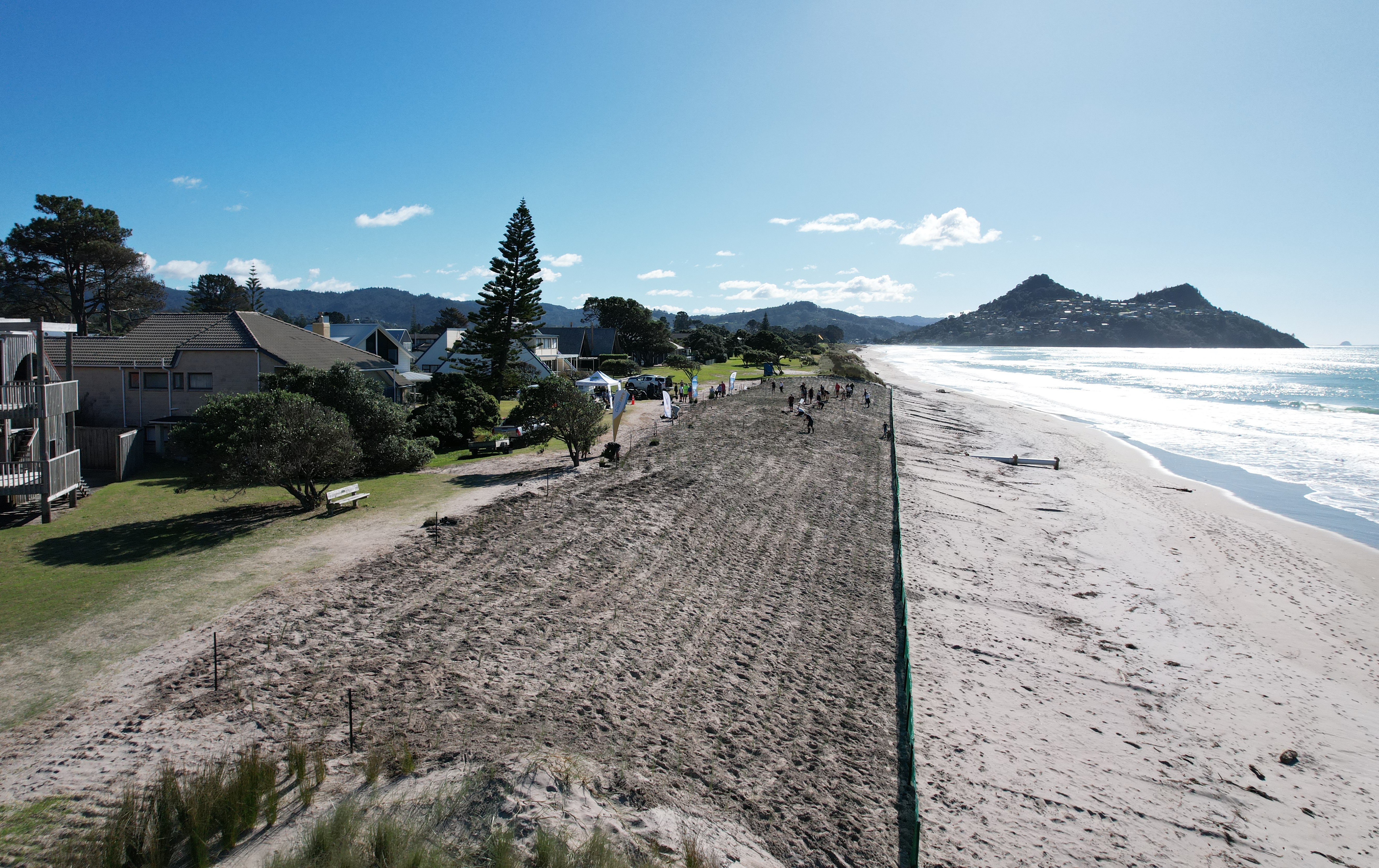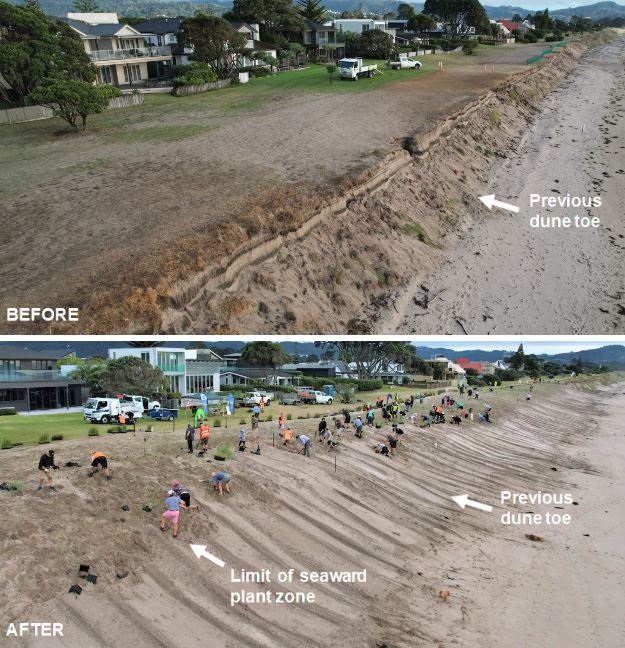Communities caring for our Coast

Coast Care is a coastal restoration programme, run in close partnership with local communities, local authorities and schools that aims to restore and protect the sand dunes along our Thames-Coromandel beaches.
Upcoming dune planting events:
- Monday 7 October - Tairua back dune by Beach Access 5
- Wednesday 9 October - Island View Reserve, Whangamatā
Times TBC. All you need to bring is covered sturdy footwear, suitable clothing, gardening gloves, and a spade.
Who is involved?
Coastcare Waikato is a community partnership programme to restore coastal areas throughout the Waikato region. The programme involves volunteers who care about our coastal environment giving their time and expertise to looking after our dunes. This includes residents, schools, iwi, the Department of Conservation, district councils and Waikato Regional Council working together to restore, protect and look after our coasts and all the species that live and grow here.
Coastcare volunteers help with beach clean-ups, planting native dune plants, managing the spread of weeds and pests, fencing and much more. Coastcare offers advice on reducing erosion through planting and also provides resources such as native plants and fertiliser. Part of Coastcare’s role is also to educate people on why caring for our dunes is such an important part of protecting our beaches and that we all have a responsibility to our environment. For the latest information you can follow the Coastcare Waikato Facebook page.
Pāuanui Plantathon

Pāuanui was the site of a massive beach plantathon, a collaborative effort organised by the Pāuanui Dune Protection Society, in partnership with our Council, CoastCare, WRC, and dedicated community members. The event saw over 14,000 plants planted at four Pāuanui restoration sites, marking a significant step forward in dune restoration efforts.
This is their third year of plantathons. It has been great to see the community get in behind them and a fantastic opportunity to meet new people. The volunteers pick up new skills each time and are constantly learning and refining their process and teamwork.
Native sand-binding species are planted that help the dunes rebuild from erosion caused by storms. The plants are shelter, habitat, and food sources for many native New Zealand birds, reptiles, and insects.
"The restoration of the dunes here wouldn't work if the Protection Society wasn't here wasn't driving it along," says Martin Hopkins, chairperson of Pāuanui Dune Protection Society.
Our Council, CoastCare and Pāuanui Dune Protection Society are still planning events across the eastern Coromandel, and these will have the additional support of the Coastal Kaitiaki team. CoastCare is also working with DOC to determine the best course of action across all its restoration sites, and a five-year coastal restoration plan will be put in place to map out future planting events.

Visit Pauanui Dune Protection Society page
Visit Coastcare's webpage
Coastcare working to protect native coastal fauna

Protecting the habitat for some of Aotearoa New Zealand’s most threatened coastal native flora and fauna will be driving a new approach to Coastcare’s restoration work, ensuring that fauna is not unintentionally harmed by restoration efforts.
Monitoring in 2023 and early 2024 found large populations of native lizards at many Coastcare sites, which are fully protected by the Wildlife Act (1953). This means certain types of work will need to be done with permits from the Department of Conservation (DOC).
“At many sites we can continue working without a permit by using hand tools (instead of heavy machinery) and avoiding negative impacts on native wildlife,” says Andrea Whitehead, Council’s Coastal Restoration Coordinator. “However, Coastcare is putting some larger-scale restoration projects on hold to seek the proper permits before starting earthworks.”
Our Council and Coastcare are still planning many coastal planting events across eastern Coromandel, and these will have the additional support of the Coastal Tiaki team. Coastcare is also working with DOC to determine the best course of action across all its restoration sites, and a five-year coastal restoration plan will be put in place to map out future planting events.
For more information, please contact Waikato Regional Council on 0800 800 401 or coastcare@waikatoregion.govt.nz.
Visit Coastcare's webpage
Follow Coastcare on Facebook
Kūaotunu Dune Care receives national Coastal Restoration Award

Kūaotunu Dune Care is a group of Kūaotunu residents and ratepayers that recognised their local coastal environment was being invaded by exotic plant species and there was a need to come together to help. Becoming an incorporated society in 2022 opened the door for funding opportunities, enabling the group to apply for grants to purchase native plants and utilise contractors to carry out weed control. The group has just had their efforts recognised, receiving the 2024 Coastal Restoration Trust Award for Outstanding Restoration Project at a conference in Kāwhia.
Kūaotunu Dune Care has branched out over the past two years. Not only are they focused on weeds, but they are also adapting the dune care approach to protect the dunes ecologically and culturally. They have successfully introduced a new predator-trapping program to protect plants and wildlife along the coast. The group is supported by our Council and Waikato Regional Council.
Kūaotunu Dune Care Inc. meets on the third Wednesday of the month for 2 hours of weeding, planting and mulching in the back dunes, followed by a well-deserved morning tea.
Upcoming working bees:
• Wednesday 15 May: Kawhero Rock
• Wednesday 19 June: Zone 2/1 (Adjacent to our Zone One area)
• Wednesday 28 June: Grays Beach (extending previous Matariki plantings)
• Wednesday 17 July: Grays Beach, Bluff Rd
Follow the group on Facebook
Find out more about Coastcare
Coastcare reflects on 2023 planting season after 57,000 native plants restored
In December, our Council, Coastcare and the Cooks Beach Care Group hosted a Coastcare mini-conference at the Cooks Beach Community Hall.
Members of Coromandel east coast volunteer dune groups came together to reflect on the past year, celebrate the completion of the planting season and learn about some of the exciting new ways Coastcare, Waikato Regional Council, and our Council will be looking after our beautiful coastline.

We had volunteer group attendees from Whangamatā to Kūaotunu, a representative from the Bay of Plenty, and staff from Waikato Regional Council, the Department of Conservation. We also had a special guest: Moniqua Nelson-Tunley Waikato Regional Council Senior Biodiversity Officer and Coastal Restoration Trust of New Zealand Trustee came to talk to us about reptiles of New Zealand.
Cyclone’s Hale and Gabrielle showed us how vital our dunes are. High water levels and waves hammered the coastline, and the dunes acted as a sacrificial buffer, absorbing the energy. A better grasp on how coastal dunes work enables our communities to better understand why we must look after our dunes.
Monitoring was one of the key topics we covered at the Coastcare Mini Conference 2023. With the community's help, we hope to monitor dune shape, health and self-repair (recovery), planting success, biodiversity (unique species of plants), birds, reptiles and insects. We will also look at our public education – is it working, could it be better?
This year, together with community volunteers and local schools, 57,500 native plants were planted on Coromandel beaches. There were approximately 2460 volunteer planting hours recorded. Native plants on the dunes help recover and bind sand, repairing the damage caused by cyclones. The plants are shelter, habitat, and food sources for many native New Zealand birds, reptiles, and insects.
To all the volunteers in our communities who give their time to help nature and restore and protect our beaches, the Coastcare team and our Council cannot thank you enough. We could not have achieved as much as we did without you during this challenging year. As we head into the summer break, we can be proud of what we have all achieved. Ngā mihi.
If you're interested in being involved with the Coastcare program, please get in touch: coastcare@tcdc.govt.nz

Why do we need to look after our dunes?
The dunes are the backbone of our beaches, the buffer between the land and the sea. Healthy dunes are wide, gently sloping and have many dune plants to help anchor them. We now know that native dune plants play a vital role in maintaining the dunes, binding light blowing sand onto the beach, and making stable sand dunes. Without these plants, the sand blows away and dunes disappear - leaving the land vulnerable to weather and wave surges.
The popularity of our beaches, changing climate, pests and development pressure are all affecting the health of our coast, particularly dunes. This makes the work of Coast Care groups even more important in making sure our beaches remain for many more years to come.
Dunes not only provide a buffer between land and sea, they also play an important role in New Zealand’s coastal biodiversity. We have a responsibility to make sure they are protected.
Watch the video series by Coastal Restoration Trust of New Zealand in which we explore the natural processes at work behind Aotearoa New Zealand's beautiful coastlines.
1. How Beaches Work: natural coastal processes
2. Coastal Squeeze
3. Sea Level Rise
4. Fighting Nature
5. Working with Nature
6. Setbacks
7. Dune Restoration Overview
Success Story: Pāuanui Dune Planting Project

May 2022: More than 200 volunteers planted over 13,000 plants across a 260m length of shoreline at the southern end of Pāuanui beach (approximately between beach access #10 and #11) to increase coastal resilience and enable better management of the reserve space.
This was our biggest and most successful restoration event yet thanks to those involved:
- The Pāuanui Dune Protection Society
- The wider Pāuanui community and other volunteers
- Mercury Bay Environmental Trust
- Department of Conservation (Whitianga)
- NZCS
- Waikato RC
- CoastCare (Onemana, Waikato)
- Recreational Services
- Hikuai School
- Valley Ed (Thames)
- Coastlands Nursery
- Storms Contracting
- Scotty’s Bobcats
“The weather was fabulous and great community connections were made,” says our Coastal Scientist Jamie Boyle. "The Pāuanui Dune Protection Society helped drive and communicate the need for this work by pulling everyone together and contributing to the design, financing, and rationale of the work.”
The contribution showed understanding for coastal restoration (the CoastCare movement), and the importance of creating, maintaining, and enhancing a resilient dune system.
